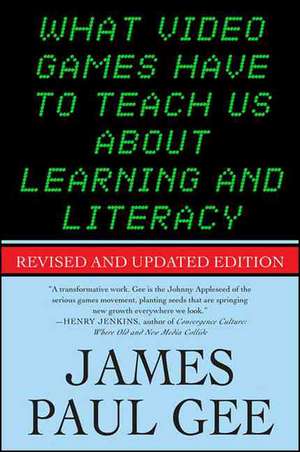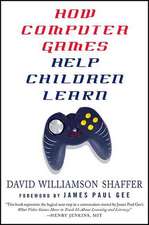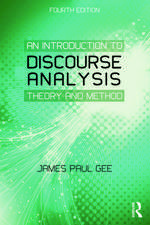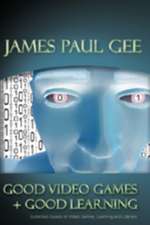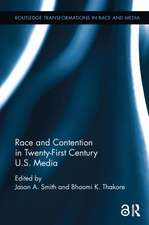Gee, J: What Video Games
Autor James Paul Geeen Limba Engleză Paperback – 30 apr 2008
James Paul Gee begins his classic book with "I want to talk about video games--yes, even violent video games--and say some positive things about them." With this simple but explosive statement, one of America's most well-respected educators looks seriously at the good that can come from playing video games. In this revised edition, new games like World of WarCraft and Half Life 2 are evaluated and theories of cognitive development are expanded. Gee looks at major cognitive activities including how individuals develop a sense of identity, how we grasp meaning, how we evaluate and follow a command, pick a role model, and perceive the world.
Preț: 117.76 lei
Nou
Puncte Express: 177
Preț estimativ în valută:
22.54€ • 23.25$ • 19.07£
22.54€ • 23.25$ • 19.07£
Carte disponibilă
Livrare economică 11-25 februarie
Preluare comenzi: 021 569.72.76
Specificații
ISBN-13: 9781403984531
ISBN-10: 1403984530
Pagini: 256
Dimensiuni: 156 x 233 x 22 mm
Greutate: 0.3 kg
Ediția:Revizuită
Editura: MACMILLAN EDUCATION
Locul publicării:Basingstoke, United Kingdom
ISBN-10: 1403984530
Pagini: 256
Dimensiuni: 156 x 233 x 22 mm
Greutate: 0.3 kg
Ediția:Revizuită
Editura: MACMILLAN EDUCATION
Locul publicării:Basingstoke, United Kingdom
Public țintă
Academic/professional/technical: Research and professionalCuprins
Introduction: 36 Ways to Learn a Video Game
Semiotic Domains: Is Playing Video Games a 'Waste of Time'?
Learning and Identity: What Does It Mean to Be a Half-Elf?
Situated Meaning and Learning: What Should You Do after You Have Destroyed the Global Conspiracy?
Telling and Doing: Why Doesn't Lara Croft Obey Prof. Von Croy?
Cultural Models: Do You Want to be the Blue Sonic or the Dark Sonic?
The Social Mind: How Do You Get Your Corpse Back after You've Died?
Conclusion: Duped or Not?
Appendix: The 36 Learning Principles
Semiotic Domains: Is Playing Video Games a 'Waste of Time'?
Learning and Identity: What Does It Mean to Be a Half-Elf?
Situated Meaning and Learning: What Should You Do after You Have Destroyed the Global Conspiracy?
Telling and Doing: Why Doesn't Lara Croft Obey Prof. Von Croy?
Cultural Models: Do You Want to be the Blue Sonic or the Dark Sonic?
The Social Mind: How Do You Get Your Corpse Back after You've Died?
Conclusion: Duped or Not?
Appendix: The 36 Learning Principles
Recenzii
'What Video Games Have to Teach us About Learning and Literacy is an important volume in a field that is currently growing significantly. - Ben Williamson, NESTA Futurelab
'...an astoundingly insightful manifesto on teaching and learning...' - Michael Hoechsmann, McGill Journal of Education
'[Gee is] a serious scholar who is taking a lead in an emerging field.' - Scott Carlson, Chronicle of Higher Education
'[Gee is] one of the worlds leading educational experts.' - The Observer
'These games succeed because, according to Gee, they gradually present information that is actually needed to perform deeds.' - Norman A. Lockman, USA Today
'Gee astutely points out that for video game makers, unlike schools, failing to engage children is not an option.' - Terrence Hackett, Chicago Tribune
'Gee...says the most challenging games prod players to push the boundaries of their skills and to adapt...' - Shannon Mullen, Asbury Park Press
'...'good' computer games...use critical learning principles to quickly teach kids to play extremely complex virtual reality games.' - Norman Lockman, Jackson Clarion-Ledger
'Rather than be reined in, today's successful game designers should be recognized as modern masters of learning theory...' - Mike Snider, Cincinnati Enquirer
'Am I a bad parent for letting [my child] play video games at 4? Not at all, according to Gee.' - Jim Louderback, USA Weekend Magazine
'...Gee suggests that...schools...are 'in the cognitive-science dark ages.' - Jeffery Kurz, Meriden-Wallingford Record-Journal
'...an astoundingly insightful manifesto on teaching and learning...' - Michael Hoechsmann, McGill Journal of Education
'[Gee is] a serious scholar who is taking a lead in an emerging field.' - Scott Carlson, Chronicle of Higher Education
'[Gee is] one of the worlds leading educational experts.' - The Observer
'These games succeed because, according to Gee, they gradually present information that is actually needed to perform deeds.' - Norman A. Lockman, USA Today
'Gee astutely points out that for video game makers, unlike schools, failing to engage children is not an option.' - Terrence Hackett, Chicago Tribune
'Gee...says the most challenging games prod players to push the boundaries of their skills and to adapt...' - Shannon Mullen, Asbury Park Press
'...'good' computer games...use critical learning principles to quickly teach kids to play extremely complex virtual reality games.' - Norman Lockman, Jackson Clarion-Ledger
'Rather than be reined in, today's successful game designers should be recognized as modern masters of learning theory...' - Mike Snider, Cincinnati Enquirer
'Am I a bad parent for letting [my child] play video games at 4? Not at all, according to Gee.' - Jim Louderback, USA Weekend Magazine
'...Gee suggests that...schools...are 'in the cognitive-science dark ages.' - Jeffery Kurz, Meriden-Wallingford Record-Journal
Notă biografică
JAMES PAUL GEE is one of the most well-known professors of education in the United States. He teaches at the University of Wisconsin, Madison and is the author of several books.
Caracteristici
1 The issue of video games and their harmful/helpful effects on children and young adults is a hot topic
2 The Hardback sold very well
3 The book does not shy away from controversy, even finding good news in shooter games vis à vis adolescent cognitive development
4 The Observer newspaper recently called Gee 'One of the worlds leading educational experts'
2 The Hardback sold very well
3 The book does not shy away from controversy, even finding good news in shooter games vis à vis adolescent cognitive development
4 The Observer newspaper recently called Gee 'One of the worlds leading educational experts'
Descriere
A controversial look at the positive things that can be learned from video games by a well known professor of education. James Paul Gee begins his new book with 'I want to talk about vide games- yes, even violent video games - and say some positive things about them'. With this simple but explosive beginning, one of America's most well-respected professors of education looks seriously at the good that can come from playing video games. Gee is interested in the cognitive development that can occur when someone is trying to escape a maze, find a hidden treasure and, even, blasting away an enemy with a high-powered rifle. Talking about his own video-gaming experience learning and using games as diverse as Lara Croft and Arcanum, Gee looks at major specific cognitive activities:
* How individuals develop a sense of identity
* How one grasps meaning
* How one evaluates and follows a command
* How one picks a role model
* How one perceives the world
This is a ground-breaking book that takes up a new electronic method of education and shows the positive upside it has for learning.
* How individuals develop a sense of identity
* How one grasps meaning
* How one evaluates and follows a command
* How one picks a role model
* How one perceives the world
This is a ground-breaking book that takes up a new electronic method of education and shows the positive upside it has for learning.
